- Home
- Steven Harper
Unity Page 22
Unity Read online
Page 22
Sometimes missiles overshot their targets, either because the target dodged or the missile’s guidance system failed. In either case, there was a small chance that it might hit something else, which meant unexploded ordnance had to be recovered. Or it did in the days before the Cylon attack. Nobody much cared now. Despite this, missile ordnance still carried a homing signal that allowed it to be tracked. It was activated automatically after the missile launched, but there was a manual switch as well. Now that Sharon had untied her, Kara might be able to activate the thing.
If she could distract Sharon. If her body would cooperate.
“What’s the … difference,” she stammered, “between cold snow and hard hail to the—”
“The difference between faith and conviction?” Sharon interrupted. “Conviction comes only with proof. Faith comes from within.”
“Does P-Peter think the same wish for a good—”
“Who cares what Peter thinks?” Sharon said. “He’s nothing but a toy. Cute, too, and damned good in bed, after he was trained.”
“You’ve never frakked a big baloney sandwich on white—”
“Oops!” Sharon put on a patently false girlish pose. “I’ve gone and said too much.”
Kara gritted her teeth. She didn’t care about Peter anymore, or who he might have frakked around with. All she cared about right now was that damned bag of ordnance. “You never,” she managed to say without babbling. “Not good enough for him. Be like putting his dick into a toaster slot instead of a Cylon slut who—”
The slap rocked Kara to the base of her spine. She cried out, long and hard, much louder than the blow actually called for. Peter, still standing on his box as the last of his people streamed away, heard the sound. So did Tom Zarek, who was working on some electronic equipment over in a corner. Kara collapsed into tears that were only half faked and covered her face with shaking hands, though she peered through her fingers. Peter jumped down from the box and ran over. Zarek followed.
“What the hell are you doing?” Peter snapped. “Get away from her!”
“She’s a mouthy bitch,” Sharon said.
Kara managed to raise her middle finger at Sharon. This time the Cylon woman drew back a fist. Peter stepped between them and pushed Sharon back. The move caught Sharon by surprise and she backpedaled several steps, her eyes wide above her red mask.
“I said to leave her the hell alone,” Peter snarled. “She’s my consort.”
“Watch it, Petey-boy,” Sharon snarled back. “I don’t know who you think you are, but—”
“I think I’m the Unifier,” he spat. “Do you doubt who I am?”
Kara forced herself to move while Sharon was distracted. She managed to pull the duffel open and locate the switch that activated the homing signal, but her treacherous fingers wouldn’t grab hold of it. Twice, she felt the smooth metal of the switch, and twice she felt her fingers slip away from it.
“Don’t get a swelled head,” Sharon was saying into Peter’s face. “The One may have chosen you, but that doesn’t mean you rule everyone you see.”
Heart pounding, Kara hooked a finger under the switch. Come on, she prayed. Come on!
Her finger slipped off. Kara wanted to howl in frustration.
“My followers do as I say because they believe the One speaks through me,” Peter said. “Don’t you believe it?”
Sharon seemed to realize she was breaking her cover. She swallowed hard and visibly forced herself to take a step backward and bow her head. “I’m … sorry, Unifier. I lost my temper. My apologies.”
“We all make mistakes,” Peter said magnanimously.
Kara made one more try. Her mouth was dry as a raisin. If this didn’t work, she was frakked. Her finger found the switch—
—and Sharon saw her. With inhuman quickness, she spun, knelt, and grabbed Kara’s quivering wrist. Kara tried to pull free, but her body wouldn’t obey. Sharon shoved Kara’s hand away with contempt.
“Now just what are you up to with that?” she said.
“That’s missile ordnance,” said Tom Zarek, speaking for the first time. “What the hell is that doing here?”
“Missile ordnance?” Peter echoed. “You mean a bomb? You have a frakking bomb?”
“All part of the plan, Unifier,” Sharon said calmly, pulling the duffel bag out of Kara’s reach.
“Whose plan?” Zarek said. “I don’t remember talking about a bomb.”
“It’s an insurance policy,” Sharon told him. “Those marines won’t close with us if they know we have this. It’ll keep them at a distance, if necessary.”
“We can’t blow up the ship,” Peter said, clearly shaken. “Shit! Passive resistance, remember?”
“They don’t know that,” Sharon returned. “For all they know, we’re a bunch of religious suicide terrorists who’ll kill a whole shipful of people rather than be captured. I’m not going to set it off, for frak sake. I’d die, too.”
“Bluffs aren’t worth the air it takes to make them,” Zarek said. “Good players usually call them, and Adama’s very good.”
“So what? I’m not counting on Adama and the marines believing me—us. If they do, it’s a nice break and it’ll make it easier for us to escape. If they don’t, we still escape.”
“Where?” Peter said. “How?”
“The less you know, Unifier, the better,” Sharon said. “Just in case.”
“Wait a minute,” Zarek said. “We already discussed this. I told you that the marines won’t fire on civilians, so you’re supposed to use passive resistance to wear them down and convince them to leave you alone. And if that doesn’t work, Peter is supposed to get caught. He hasn’t done anything illegal, so he’ll become a prison martyr like I was. The press will keep Peter and his music alive until his trial and acquittal. I’ve already tipped off some of my press contacts about the possibility.”
“I’m not willing to go to jail for my beliefs just yet, thanks,” Sharon said. “Even if I have a key to the back door.” She nodded at the monitors Zarek had set up in the corner. “Check out phase one of the plan, there.”
Peter looked torn between the contents of the duffel bag and the monitors Zarek had set up in the corner. At last he said to Sharon, “Don’t touch Kara,” and strode away. Zarek went with him.
Sharon looked hard at Kara, then calmly reached into the bag. Kara tensed. Sharon tilted the duffel so Kara could see every movement. Wiggling her eyebrows for comic effect, she deliberately flipped the switch that sent the signal. Kara couldn’t keep in a gasp.
“Surprised?” Sharon said to Kara.
And suddenly Kara wasn’t. The Cylon’s actions made perfect sense.
“I … know what … mish nar—no. Know … your plan,” Kara managed.
“Really?” Sharon looked down at Kara, a small smile on her face. “What plan would that be?”
“You don’t … care … care about Peter or … galimaufry Alice has a blue—dammit! Or about … the One.”
“No shit.”
Kara shoved hard, and the words spilled out the way she wanted them to for once. “It’s a trap. You want the armed force to board and find us so you can blow up Peter and what few soldiers we have who aren’t sick and you’ll die but just be downloaded into a new body because you don’t care anymore that you’ll lose your … your …” She trailed off.
“Lose my what?” Sharon said.
Kara looked up at Sharon, but not at her face. From this angle, she could see Sharon’s stomach. It lay perfectly flat beneath her stolen gray jumpsuit. There was no hint of roundness, not even a tiny bulge.
Sharon Valerii—this Sharon Valerii—wasn’t pregnant.
CHAPTER 14
The acrid smell of burning ceramic scorched Helo’s nostrils. It felt strange to be kneeling on the outer hull of a spaceship without a vac suit for protection, but he kept his mind on his job. The marine ship had clamped itself to the Monarch like a barnacle and Captain Adama himself had opened the floor hatch,
revealing the gray ceramic. Helo kept his hands steady and his eyes on the white-hot flicker of flame that was burning a careful circle through the hull of the mining ship. Goggles protected his eyes. The strike force gathered behind him, bodies tense and weapons ready. Helo could hear their body armor creak as they shifted position.
The final bit of ceramic gave way. Helo jumped back as a human-sized circle dropped into the ship and landed with a loud clang. He extinguished the torch. Captain Lee Adama dropped the end of a cord into the space beyond. The other end was hooked to a small monitor clipped to Lee’s belt. It showed a dim, empty corridor.
“No apparent resistance,” Lee reported. “Move in!”
Moving with trained precision, the strike force members dropped into the hole. The first ones scurried out of the way, weapons drawn to cover the ones who came next. Helo and Lee Adama were the last.
“They have to know we’re coming,” Helo said in a low voice. “Why aren’t they meeting us?”
“Maybe they don’t want a fight,” Lee murmured. “Maybe this’ll turn into a game of hide-and-seek.” He holstered his rifle across his back and unrolled a long square of paper, specs for the Monarch. “Gaeta said that since we stopped enforcing the quarantine, something like ten ships have docked with the Monarch. The only place where all those people could be gathering is the main processing area here. But that’s just a guess. I wish we knew for sure.”
“Sir,” Racetrack said. “I’m getting a signal.”
Lee spun like a small tornado. Helo wondered if the captain was thinking about Kara like he was thinking about Sharon. “From who?”
“No one in particular.” Racetrack held up her radio so Lee could see the readout. “It’s a missile ordnance tracking signal.”
“Kara,” Lee breathed. “She’s found a way to tell us where she is and make it look like an ordnance signal.”
“I don’t know, sir,” Helo said doubtfully. “What if the Unifiers really have ordnance?”
“Doesn’t seem likely they’d activate the homing device,” Racetrack said. “It gives away their position.”
A series of clanks and thuds rang through the corridor. Everyone, including Helo, readied their weapons, rifle barrels pointing in a dozen different directions like an angry porcupine. After a moment the noises faded.
“Mining ship,” Racetrack said as another set of sounds started up, further away this time. “Lots of weird noises around. Let me get to work and we can get moving.”
Helo let himself relax. A little, anyway. Lighting in the corridor was dim, and the whole place smelled of algae and engine oil. Helo shifted inside his flak armor. A belt hung with ammunition and equipment dragged at his waist, a helmet covered his head, and he carried a pulse rifle. The back of his head wouldn’t stop itching. The helmet wouldn’t let him scratch, which made it worse. Doc Cottle had been too busy with plague patients to look at him, and now Helo was on a strike force, where an itchy head was considered something you sucked up.
Technically Helo shouldn’t be here. He was combat-trained, yes, but he wasn’t trained to sneak aboard an enemy ship and track down terrorists. But Captain Adama, faced with hundreds of people whose hands shook too much to fire a weapon, had been forced to augment marines with other personnel. At the moment, that included Helo. So far his hands had proven plague-free and rock-steady, though he found himself checking every few minutes.
The search for Sharon had been suspended. No one was available to look for her. Helo couldn’t decide if this was a positive or a negative. In the end, he had decided to stop thinking about it altogether. If she turned up, she would turn up.
But he also wondered about the baby.
He was going to be a father. The idea ambushed him at odd moments, like a mugger whacking him over the head and dragging him into an alley. A baby. A little girl or boy who would look at him and say, “Daddy!” First steps, first words. First date.
From a prison cell. How would Adama handle this? It wouldn’t be fair to the baby to keep it in a cell, and it wouldn’t be right to keep it away from Sharon. Adama would have to make some sort of ruling, and that pissed Helo off. Every other time a baby was born, people celebrated. New life was precious and valued and loved. Except his. His baby would be born in a prison to a lifetime prisoner. His baby would be born to a hated enemy. His baby would endure a life of stigma. His baby’s birth would be decided by military law, his parenting held up to military scrutiny. The baby had committed no crime, but already it was being treated like a criminal. Helo got angrier and angrier just thinking about it.
Racetrack jostled Helo’s arm, bringing him out of his seething reverie. He almost jumped, realizing how foolish it had been for him to lose himself inside his own head when he was in enemy territory.
“Careful,” Racetrack said. She had opened a wall panel and was tearing at the nest of cable inside. “Pass me that shunt, would you?”
Helo obeyed. Racetrack selected a cable and attached the shunt while the rest of the platoon stood guard. Racetrack, an adept ECO, flipped on a portable screen. Helo peered over her shoulder. At first the screen remained blank, but she flicked dials and switches and eventually came up with an image of a large room crammed with people. Several of them wore red masks.
“I’ve broken into the security cameras, Captain,” she reported. “I think we’re looking at the main processing area.”
“Crowded,” observed a marine Helo didn’t know.
Captain Lee Adama checked the schematics. “It’s also on the only path from here to where the signal is coming from.”
“So we have to go through them to get to Kara?” Helo said.
“Looks that way.”
“Sir,” said one of the marines, “our orders are not to shoot or attack civilians. How are we going to get through those people without attacking?”
Lee Adama looked at the people on the screen, then at the schematic in his hand, then at the hole in the bulkhead above him. “We’re not,” he said.
“Commander,” said Felix Gaeta. “Lieutenant Edmonson is beaming a direct signal to us. We have video of what’s happening on the Monarch.”
“Put it up, Lieutenant,” Colonel Tigh ordered.
Bill Adama turned his eyes up to one of the monitors above his head. Lee was out there, leading the Monarch strike in an attempt to rescue Kara Thrace, and Adama had to stand there in CIC and pretend he wasn’t worried, that his heart wasn’t leaping in his chest, that he wasn’t sweating under his uniform. No reason for distress, everyone. The Old Man has everything under control.
He adjusted his glasses and peered at the monitor. It remained blank.
“There a problem, Mr. Gaeta?” Tigh asked.
“Just … taking a little longer to get the telemetry right, sir.” Gaeta, flushing, worked at his controls, his hands hidden by the rim of the console. Adama knew what was causing the delay, and he kept his face carefully neutral. He shot Tigh a quick glance to let him know that the colonel should keep his mouth shut. Tigh gave a tiny nod in acknowledgment. Dualla busied herself at her own console, as did everyone else in CIC. Their work was similarly slow and laborious and several stations were unstaffed, but no one took note. Yep, no reason for distress. Everything’s under control. Ignore the elephant standing beside you. We all know it’s there, we all know why Gaeta can’t work his console, and we’re all going to pretend we don’t. The marines will bring back Peter Attis alive, healthy, and chock full of curative protoplasm to cure the disease we aren’t talking about. We won’t mention that the Cylons could pop up at any time and turn the Fleet into an expanding cloud of gas and debris. We won’t mention that the prions are turning our brains to sponges and that our only hopes are the leader of a religious movement that kidnapped one of our best pilots, and a scientist who isn’t known for his stability.
A wave of anger suddenly swept over Adama. He was dying, dammit, dying for the second time in as many months. The frakking asshole whose life Adama had spared had repaid Adama
by infecting him with a deadly disease, creating a religious cult that fomented chaos wherever it went, kidnapping a pilot who was like a daughter to him, and disappearing into the bowels of a mining ship with the disease’s only cure. Gods, Adama had even attended the man’s concert. And what an evening that had been. Laura Roslin had clung lightly to his arm like a half-solid ghost, and the two of them sank into lawn chairs set up specifically for them, like a king and queen attending the revels of the commoners. Billy Keikeya hovered nearby like a cupbearer. And gods help him, Adama actually enjoyed the show. The music wasn’t his usual thing—as he grew older, the classics became more and more appealing—but Adama recognized good showmanship when he saw it, and Peter Attis had a hell of a voice. Laura Roslin sat next to him, unabashedly enthralled, and Adama found himself feeling pleased and proud, as if he had somehow arranged Peter’s rescue and subsequent concert for her benefit. Anything that reduced her pain was, in his book, a fine thing, and no more than Roslin deserved. As for himself, he’d forgotten for a while about juggling cats, about the death of his wife, about Cylon attacks. He’d even caught himself pretending that he was out on a date with a beautiful woman. Adama blushed slightly at that memory. Laura Roslin was the president of the Fleet and a good friend, nothing else. But his treacherous mind, the one that had been hungry for female company for too many years now, planted the idea nonetheless.
But the concert, it turned out, had become a major venue for spreading this plague of tongues and the point of a terrorist attack by Caprica Sharon. Billy had hustled the president away the moment that news came down, and Adama had snapped from civilian mode into commander mode. It was as if an old, heavy weight had smacked down on him with contemptuous familiarity. He had dealt with the crisis, and only later had he realized he hadn’t even bid Laura Roslin good night.

 The Importance of Being Kevin
The Importance of Being Kevin un/FAIR
un/FAIR The Havoc Machine
The Havoc Machine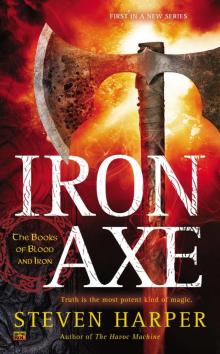 Iron Axe
Iron Axe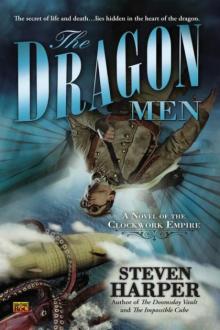 The Dragon Men
The Dragon Men The Doomsday Vault ce-1
The Doomsday Vault ce-1 The Doomsday Vault
The Doomsday Vault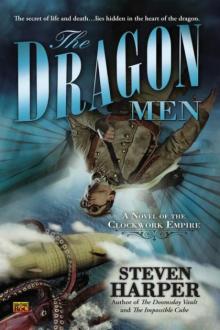 The Dragon Men ce-3
The Dragon Men ce-3 The Impossible Cube
The Impossible Cube Blood Storm: The Books of Blood and Iron
Blood Storm: The Books of Blood and Iron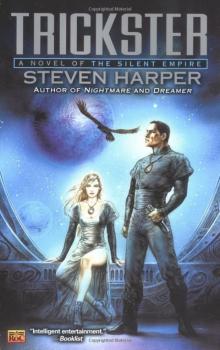 Trickster se-3
Trickster se-3 Offspring
Offspring Bone War
Bone War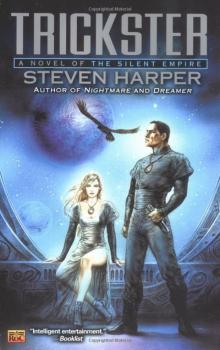 Trickster
Trickster Unity
Unity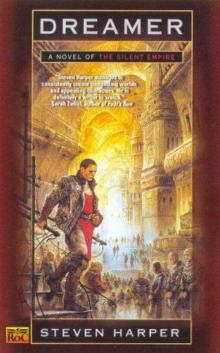 Dreamer
Dreamer The Havoc Machine ce-4
The Havoc Machine ce-4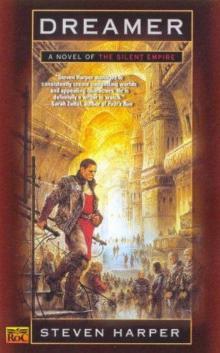 Dreamer se-2
Dreamer se-2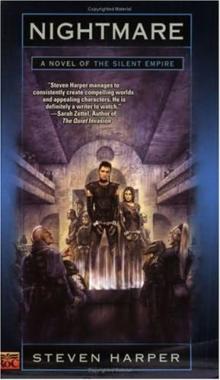 Nightmare se-2
Nightmare se-2